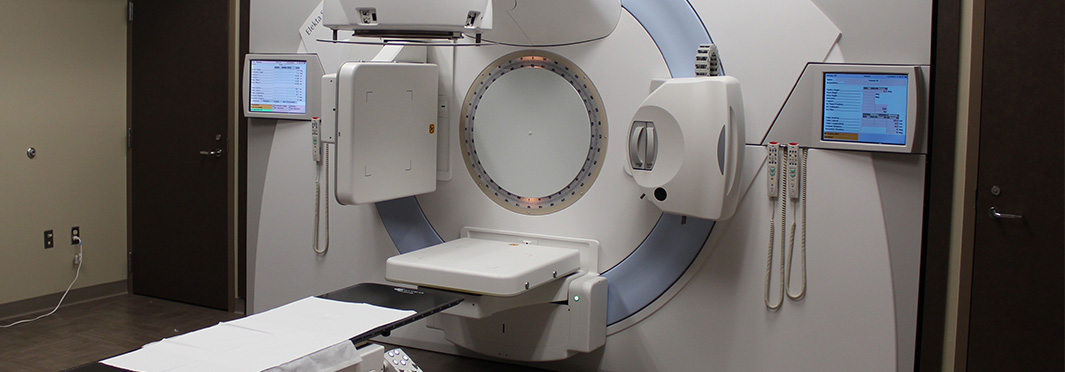
Frequently Asked Questions
What is radiation therapy?
Radiation therapy is a cancer treatment that uses high doses of radiation to kill cancer cells and stop them from spreading. It is delivered outside the body by a machine called a linear accelerator which directs high energy x-rays to the part of the body where the cancer is located.
How does radiation therapy work?
Given in high doses, radiation kills or slows the growth of cancer cells. Normal cells are also damaged, but they tend to recover from the effects of radiation. Cancer cells grow and multiply more frequently than normal cells and are more likely to be damaged by radiation. Radiation doses are high enough to kill cancer cells but low enough to limit damage to healthy cells. It takes days or weeks of treatment before cancer cells start to die. Cancer cells keep dying for weeks or months after the radiation therapy ends.
How long do the treatments take?
The first treatment usually takes about 30 to 45 minutes (which is longer than the usual 10 to 15 minutes). This is because more x-rays are required initially to confirm that the treatment position perfectly matches the treatment plan position.
Appointments are scheduled every 15 minutes Monday through Friday. Treatment courses can be as short as one day or as long as eight weeks.
There are scheduled weekly doctor checks. During these visits, the physician and physician assistant answer patient questions, evaluate tolerance to the treatment, and (if applicable) evaluate tumor response.
Is radiation therapy used with other types of cancer treatment?
Radiation may be the only treatment, or it may be used in combination with surgery and/or chemotherapy. It can be given before surgery to shrink the size of the tumor but more often is given after surgery. The same applies with chemotherapy. Patients may receive chemotherapy before, during, or after radiation; this will depend on the type of cancer being treated.
Who is on my radiation therapy team?
Radiation Oncologist
A radiation oncologist is a doctor who specializes in using radiation therapy to treat cancer. He or she prescribes how much radiation a patient receives, plans how treatment is given, closely follows patients during the course of treatment, and prescribes care required to help with side effects.
Physician Assistant
A physician assistant is a person who has been trained to perform under the supervision of a physician. This professional works closely with the radiation oncologist, assisting with the care and side effects of patients. The physician assistant may see a patient for follow-up visits to assess how well the radiation has worked. A physician assistant may be referred to as a "PA."
Medical Physicist
The medical physicist is involved in the treatment planning process along with the radiation oncologist and dosimetrist. He or she also performs special tests on the linear accelerator on a regular schedule and reviews the radiation doses patients receive.
Dosimetrist
The dosimetrist works under the direction of the radiation oncologist and physicist to plan the details of each patient's treatment. The dosimetrist devises a treatment plan using a computer that assists in calculating the best way to deliver radiation to the target while minimizing the dose to nearby healthy tissue.
Radiation Therapist
Radiation therapists work and interact with patients during radiation therapy sessions. They position patients for treatment and operate the linear accelerator to make sure patients receive the radiation doses prescribed by the radiation oncologist.
Office Staff
The office staff assists patients with making appointments, helps with billing questions, and ensures patient charts are complete and contain the medical information required to make a thorough assessment of each patient's treatment plan.
Will my insurance cover radiation therapy?
Most insurance companies will cover at least some portion of a radiation therapy claim. Our office accepts Medicare, Blue Cross and Blue Shield, TriCare, as well as many other insurance plans. Some insurance plans require physicians to be in their network to offer maximum coverage but will offer partial coverage for those not in their network. Patients can check with their insurance providers to find out if Central Kansas Cancer Center (CKCC) is in network. If we are not in your network, please let us know, and we will do our best to work with you. This will also give us the opportunity to have CKCC added to the network for your insurance company.
Some insurance companies require pre-approval or prior authorization for services rendered. The CKCC office staff are happy to help patients acquire those authorizations when necessary. Patients who are unsure about their insurance company requirements should check with their insurance providers prior to the first appointment.
How do I get an appointment?
To get an appointment at Central Kansas Cancer Center, a referral from the medical team that is involved in the patient's cancer care is required. This referral can come from a surgeon, family physician, oncologist, or any other entity that is currently managing the patient.
For more detailed information about cancer, go to our Resources page. (This information is intended to provide general information only. A patient should always talk with his or her radiation oncologist for information and advice).